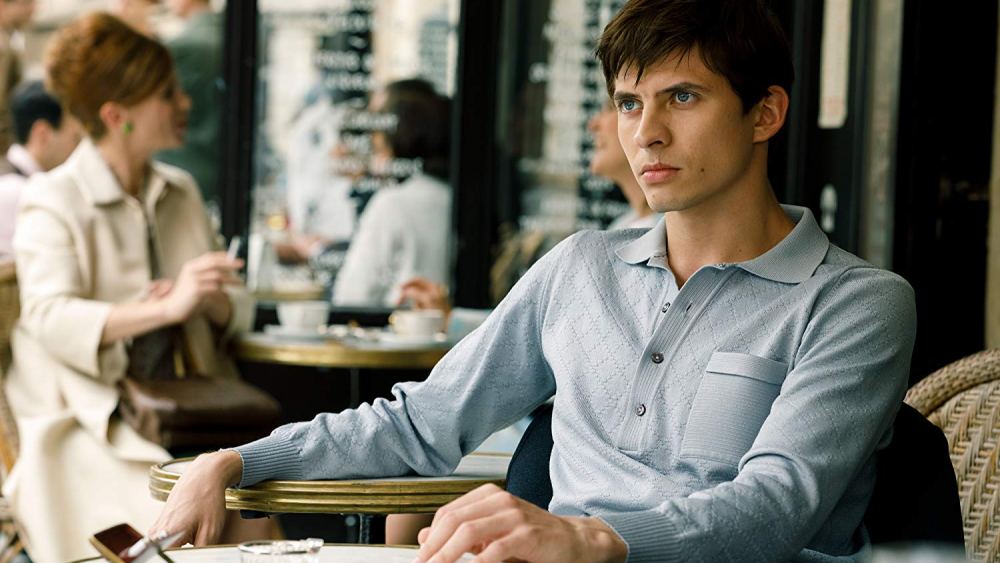THE WHITE CROW
Sony Pictures Classics
Reviewed for Shockya.com & BigAppleReviews.net by: Harvey Karten
Director: Ralph Fiennes
Screenwriter: David Hare
Cast: Oleg Ivenko, Adele Exarchopoulos, Ralph Fiennes, Raophel Peronnaz, Chulpan Khamatova, Sergie Polunin, Dalypso Valois
Screened at: SONY, NYC, 3/20/19
Opens: April 26, 2019
Rudolph Nureyev would likely be famous even if he remained with dance troupes in Moscow, but became an icon when he defected to France. Why would anyone want to defect from Mother Russia? Possibly the same reason people risked their lives in the bad old days, most notably when East Germans tried to flee to the West. Communism, in the opinion of many, is an example of social engineering gone wrong. It asks people to conform to an economic way of life that is unnatural. Therefore those governments who call themselves communist—whether they follow orthodox Marxism or not—have to keep control on its residents lest they evacuate en masse from this unnatural environment and make new homes in countries that simply do not need this kind of control.
But what of people who have done well in communist states like the former Soviet Union? Creative people who have become well known, have been educated by the state, and whose vocations are subsidized by the government? Think of Rudolph Nureyev, ascending to the potential of the Bolshoi Ballet, considered good enough to join a group going to Paris to dance as representatives of their proud state. Why would he want to leave everything behind? Strangely enough, we simply do not know even while we are riveted by Ralph Fiennes’ “The White Crow,” flexing his directing muscles for the third time. Sure. Nureyev liked the glitter of Paris, as did his fellow dancers who looked at the Champs Elysees goo-goo eyed. Maybe not all of them were too pleased when the bureaucrats assigned to keep an eye on the troupe gather all passports as they descend from the bus to spend a few days wowing the French. What country in West would think of collecting passports, handing them back only as they are returning to Moscow from the airport?
Then again, “The White Crow” is entertaining enough so we go home not disappointed without the insight that drove us to watch this movie. It’s fragmented, going from Nureyev’s birth on a train of the trans-Siberian railroad, and who was prepared from an early age for a career as a dancer. We watch as he develops an ego, strong enough to refuse to be trained by a teacher who he thinks does not like him, then taking up with Alexander Ivanovich Pushkin (Ralph Fiennes). The principal role is played by Oleg Ivenko, a Ukrainian dancer in his debut as an actor, a handsome fellow playing a man who rejects the communist view that the good of the state is paramount over the desires of the individual.
In Paris Nureyev flirts with Clara Saint (Adèle Exarchopoulos), who is on the rebound after the death of her boyfriend, a woman of some influence given her relationship with the son of André Malraux, who is France’s minister of cultural affairs. While he is staying out late enjoying the entertainments that Paris offers, he causes his handlers anxiety, suspecting that he could become a great embarrassment for the Soviet Union is he decides to defect. He continues his training with Pushkin, played by director Ralph Fiennes with such meekness that we wonder how such a person could inspire a ballet troupe. The poor man’s wimpy personality appears to push Pushkin’s wife Xenia (Chulpan Khamatova) into seducing Nureyev, though the bisexual performer nurses a craving for his roommate Yuri Soloview (Sergei Polunin).
Nureyev shows his temperament, not always held in check, when he feels patronized by a Russian waiter who may suspect that though he and Clara are dining together, the woman has class but the man is from peasant stock. His connection with Clara, a meeting of opposites, could result from her pleasant surprise to be with a man whose style is direct rather than wishy-washy.
The film jumps from the Soviet Union to Paris, with regular intervals shown in desaturated colors of his life as a small boy, who even then demonstrates a passion for dancing. I would have wished for more time spent on Nureyev’s theater performances, as Oleg Ivenko demonstrates everything on stage from adagio to allegro, from grande jeté to pirouette. Still, the scene of greatest drama, actual edge-of-the-seat minutes that you can find on police dramas, occurs when at the airport on the final day in Paris he asks for asylum. The KGB handlers, aware that this could happen, jump into the fray, fighting with the French airport police who with great patriotic fervor announce “This is France!”
Flashbacks do not detract from the continuity of the story, in fact we’re happy to see Maksimilian Grigoriyev depicting an enthusiastic Nureyev at the age of eight. This is a movie with great charm, glorious dancing and high drama, concluding with our excitement to watch a man thumbing his nose, or rather extending the middle finger, to the duplicitous agents of the big, bad Soviet Union.
127 minutes. © 2019 by Harvey Karten, Member, New York Film Critics Online
Story – B+
Acting – A-
Technical – A-
Overall – B+






